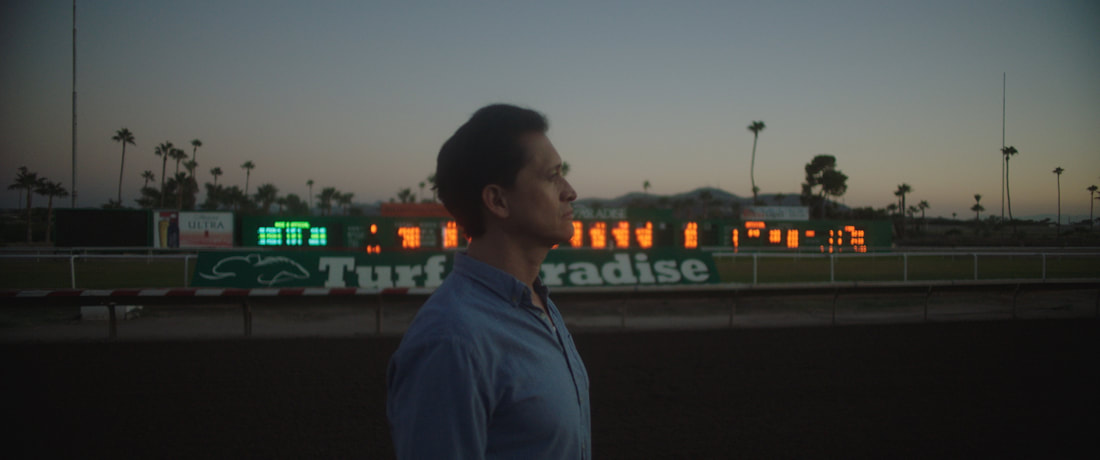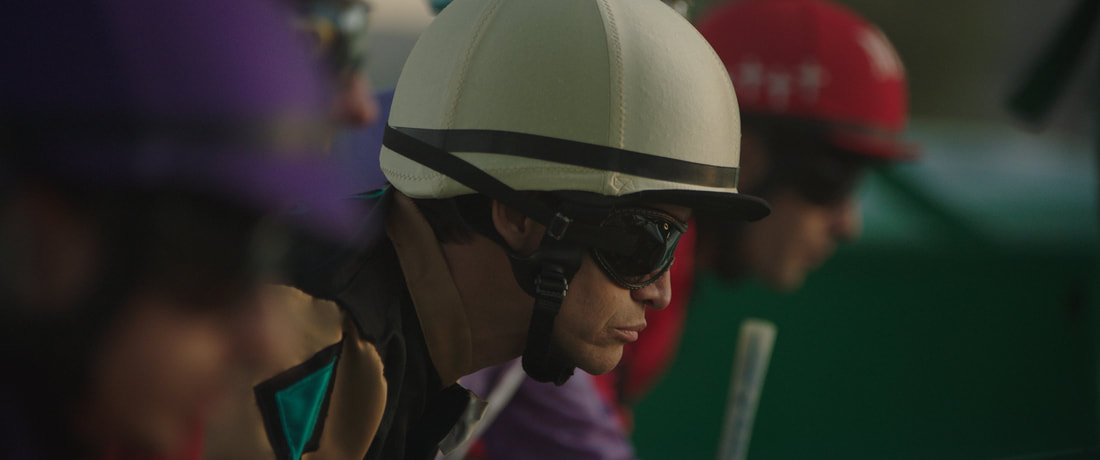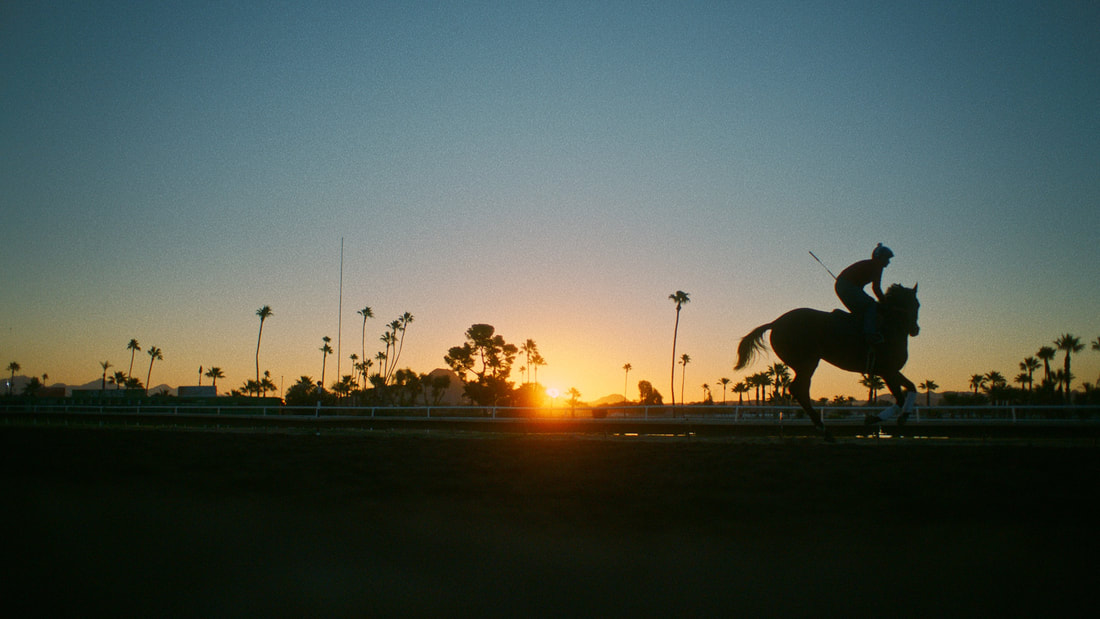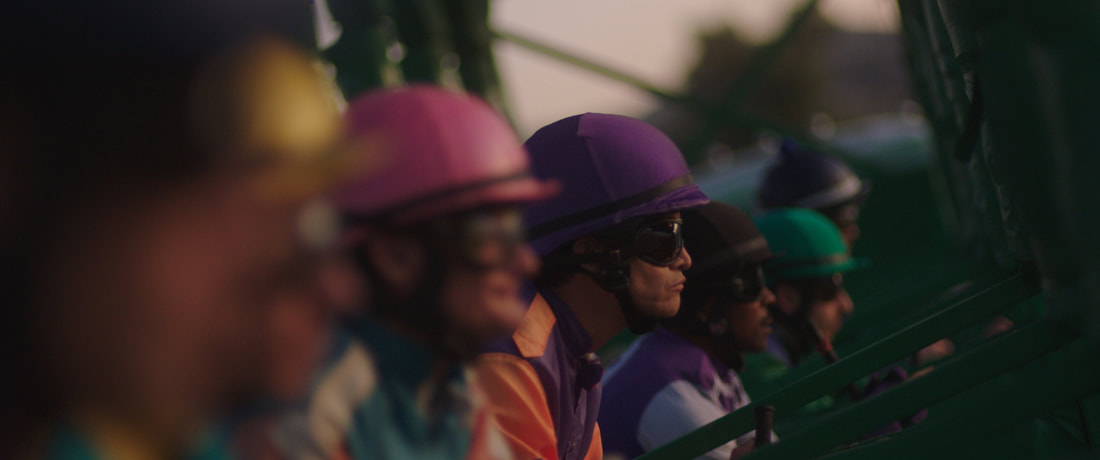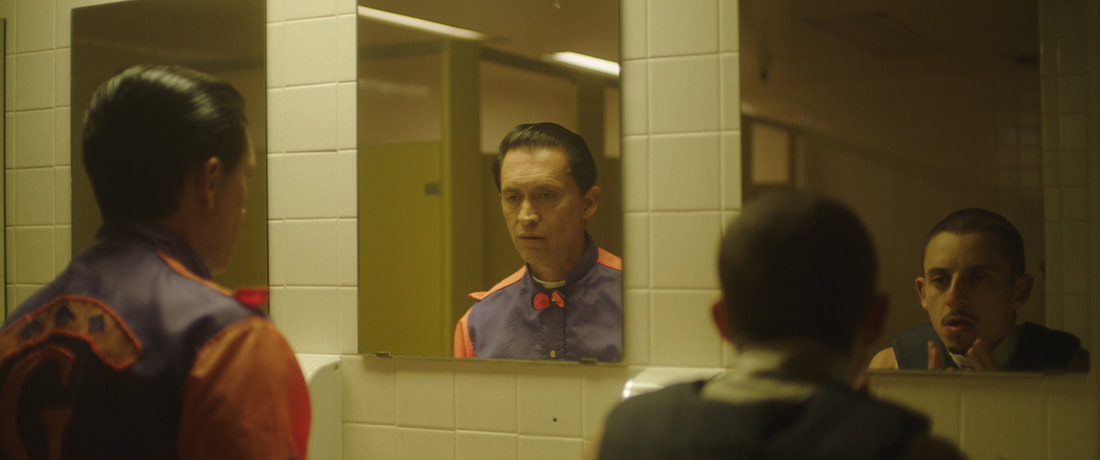|
Interview by Dan Skip Allen
It's always interesting to see a character that is predominantly known for being a character actor step into the leading role, and the extremely talented Clifton Collins Jr. gets that opportunity with the horse racing film Jockey. We at disappointment media got the opportunity to talk with Collins Jr. about the film and his role, including what he did to prepare for the film and his relationship with the cast and crew. Check out the interview at the link below!
On Preparing for the Role
disappointment media: Jockeys notoriously have a very rigorous training routine prior to their races, did you have a special routine you had to do to prepare for this challenging role?
Clifton Collins Jr.: Yeah, I was constantly doing calisthenics and similar workouts, what they were doing. In conjunction with that strict diet, that's probably not conducive to the type of workouts I was doing. But it did help me to get down to 143 pretty quickly. disappointment: Yeah, I bet that couldn't have been easy. Collins Jr.: No. [He laughs.] disappointment: How much experience did you have with with riding horses prior to working on this film? Collins Jr.: Quite a bit. But that was mostly on rodeo horses through Westworld. And I had the pleasure of working with some of the greatest horse wranglers that the industry has to offer. And those horses you know, you can run with them like you would drive a Porsche there's so accurate in like a precision sense. But the thoroughbreds are very, very different. They're like the dragsters of the horse world. So they're not going to be doing all the maneuvering that you can do on a rodeo horse on Westworld. These horses, you just hope to nudge a little to the left a little to the right. Maybe slow 'em a smidge, or let him go to go to the front of the line and hopefully take the win. And you're not sitting on the saddle, neither. You're up and you're you're leaning on the shoulders, you're leaning forward back, and you're in sync with the horse like a band member would be. But it's it's a life and death thing as well, in addition to a rush. disappointment: This is definitely a very intimate, emotional role. Did you approach this differently from some of the other characters you've played in the past? Collins Jr.: No. And I was fortunate enough to have a previous working experience with Greg Kwedar directing Transpecos and Clint Bentley producing. So there is a beautiful shorthand that was developed as a result of us collaborating together. And this one, the three of us very closely worked in really developing this, and then once Molly and Moises came to set a week early, we were able to get whatever intel that they were bringing to it as well because they were spending their own time with the trainer and with the the jockeys. But I was with the jockeys every single day, two weeks before we started shooting. On Jockey
disappointment: One of the most interesting things about the film as the father-son dynamic, how did you
approach this part of the story? Collins Jr.: Oh, very tenderly and painfully. I've got a past working relationship with Moises. We did a film called The Perfect Game. And there was five kids there that I mentored that I'm still fairly close to today, except now they're grown ass men. So it was fantastic to work with Moises and watch and become this young, cultured thespian. But you know, he has turned into an adult. So I had to like kind of like give him a heads up, "Yep, I am still an idiot, the same idiot you worked with last time. Obviously, you know, I'm gonna bring it. I'm gonna be here for you. Whenever you need me, you got access to me 24/7." So there was an element of trust there. But it was so painful too. So we explored a lot together. We went through a lot of the stuff. You know, sometimes Greg and Clint would be there in the room with me, then sometimes they wouldn't. But Moises and I, and also Molly and myself would also spend quite an amount of time in my room going through scenes and exploring the emotions and you know, what's really happening to hopefully evolve it because it was constantly evolving as we were shooting. disappointment: One of the most impressive things about your performance is how you were able to capture some of the small mannerisms that jockeys have. How did you work to perfect those? Collins Jr.: Honestly, it was really just sticking around. Just being in the jockeys' room because I was there all the time. I cut off my ties from L.A. so that I could just be completely consumed with that world. You know, so if I found out they're gonna watch a movie or this or that. You know, sometimes we go off and watch a movie that's out of the box. It's got nothing to do with jockey being a horse rider or any of that stuff. So I would shy away from that because if I can double dip and steal more for more of what was useful for the film and the role, I would do that. But it was really as a result of being with them and speaking to some of the retired jockeys as well. You know, I got to find out how they retired, why they retired. Did they retire on their own? Were they forced into it? You know, because a lot of these guys, they get paralyzed or injured or maimed. And then they may, they can still walk, and they have their facilities more or less, but they can't ride. They love it so much, they'll become an agent, or they'll become a trainer or all these other things. So, you know, picking their brains and that kind of stuff. disappointment: You've worked with Clint Bentley and Greg Kwedar before. How did that relationship progress with this film? Collins Jr.: It progressed in such a way that we can't wait to do our third film together. You know, there's a certain magic that happens when the three of us are working together, and you take any one of us out of the equation, it's just, it's not the same. So we developed a shorthand on Transpecos. You know, we maintained a friendship throughout the years. And they approached me for this one and they knew that I was going to want to jump in, they knew I was going to carry gear all those days we needed extra hands and help, and I want to be a team player. So it's a beautiful thing to have a filmmaker and a producer, two artists who belive you in such a way, and lean on you and use you that way. Because you're all leaning on each other. You can't make a movie by yourself, especially on this level. And that intimacy is beautiful, it's a family unit when you're making a movie.
Jockey hits theaters on December 29.
0 Comments
Interview by Dan Skip Allen
Jockey debuted at the 2021 Sundance Film Festival, where it was picked up by Sony Pictures Classics for a release in the thick of awards season. And while the sports genre is known for its saccharine crowd-pleasers, Clint Bentley's film takes a unique approach, both narratively and stylistically. We at disappointment media got the chance to talk with the film's director, Clint Bentley about his approach to making this film. Check out the interview below!
On Telling the Film's Story
disappointment media: What about the sport of horse racing stood out to as something you wanted to make a film about?
Clint Bentley: Actually, my dad was a jockey, and so I grew up in the world of horse racing, and I grew up behind the barns. And it really, it didn't seem that weird as a kid, because I had just grown up in it. But then, when I got a little older and became a filmmaker, I realized just what a strange, interesting kind of carnie life they lead, specifically jockeys and how I hadn't seen that really on film. And so I wanted to portray that. disappointment: Aging is a big part of a lot of people's lives. But how important was it to use this angle as part of Jackson Silva's life and struggles? Bentley: Yeah, it became something that my co-writer and co-producer Greg Kwedar and I were working on the script. And early on, the script was about a younger jockey. And Jackson was a supporting character in those earlier ideas of the movie. But then, he really hit on the idea that what Jackson is going through as a character, in this kind of aging out but not being ready to go and being used up but still having a lot of passion for this world is very similar to what the sport of horse racing is going through in general. And it kind of acts as a perfect metaphor for it. So we just leaned into that. On the Film's Unique Style
disappointment: The racing scenes are definitely unique within the genre of sports movies. What did you do to create the visual style in these portions of the film?
Bentley: Yeah, as I was doing doing early directing prep, I took all of the horse racing movies, and I pulled their races out. And then I cut them up in an editing program, in Premiere, to see like, "Okay, what was their shot selection in making these?" And what I found was like, they were all shot and cut exactly the same. And I couldn't tell once I got them all pulled apart and started putting them together, I couldn't tell which movie was this even from. And I just think that's because like, they only go one direction and there's only so many ways you can shoot it. But then once I got to a place where we were actually making the film, we didn't have much money, we had a very small crew. There wasn't really a way to safely do, even if I wanted to do a big race scene, there wasn't a way to safely do it. And so, you know, I really worked closely with Adolpho Veloso, my cinematographer, and we just tried to figure out, "Okay, if we can't do this and make it feel big in the way that we would normally see a race, how can we do in an interesting way?" And locking it close in on Jackson's perspective just fit the story. And so we were doing all sorts of these little tricks throughout, just to use our limitations to our advantage. And it helped to be on a live working racetrack where races were happening all the time. And we could just film our actors around it, you know? disappointment: The score by Aaron and Bryce Dresner is excellent. How did you work with them to create a sound for the film? Bentley: Greg and I had worked with them on our first film, Transpecos. And so we had a bit of a personal history there and a connection. And then when it came time to do this one, I really wanted a score that, like the movie, it had to kind of walk a tightrope where it I wanted it to be big and emotive, but not too big and kind of saccharin. But then be atmospheric but also not too slight. And Aaron and Bryce are just brilliant. They're brilliant composers. And once we kind of talked about the feelings that I wanted to get across with with not only the movie, but each scene, they just really ran with it and created something really beautiful. And also, they created in a way that was very scrappy, kind of like the way we shot the movie. On Realism in Cinema
disappointment: One of my favorite scenes in the film is the therapy session, how did you get the guys in the
scene to tell such realistic stories? Bentley: Yeah, I love that scene, too. It's funny, there's such a oral history tradition, for lack of a better word, in that world of, they're always just sitting around telling stories because there's so much downtime between between their work. But the ideation of it was that I wanted to get certain things across about the world, and certain information that you just could never put into dialogue, because it would sound so cheesy. But as soon as you let them say it in their own words, they say it beautifully, and get so much more across than Greg or I ever could by writing it. And so that was just a case of just putting them in a room together, getting them comfortable, and they opened up. They opened up beautifully. And we had been there a couple of weeks by that point, so they they had our trust, that we weren't going to abuse that trust. disappointment: Jockey offers an intimate and realistic look at the horse training world and you yourself have some personal experience in that industry. Why did you really want to emphasize on the realism of this world? Bentley: I think partly, it's just my sensibilities as a filmmaker. And the kind of stories that I want to tell and the way I want to move to feel. And so, you know, just in general, that was my inclination. But then also, just in terms of this world, we had seen horse racing movies so many times that were that were kind of glamorized and Disney-ized. And not that those are bad things, but that that's just the representation we had seen. And I really wanted to just give a very realistic portrayal of it with with all of its beauty, but also all of its warts as well.
Jockey hits theaters on December 31.
|
Archives
March 2024
Authors
All
|
|
|
disappointment media
Dedicated to unique and diverse perspectives on cinema! |

